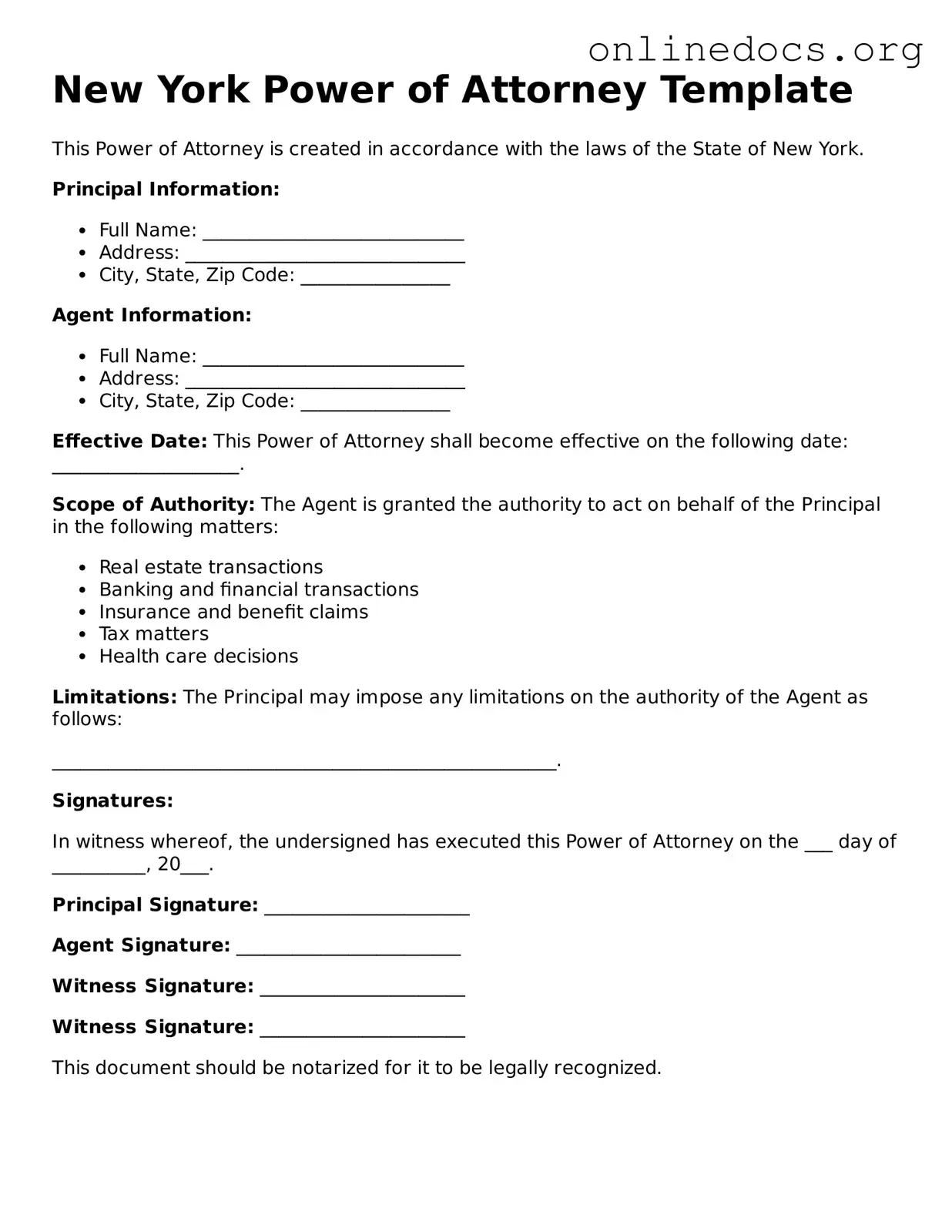The New York Power of Attorney form shares similarities with a Living Will, which allows individuals to express their medical preferences in case they become unable to communicate those wishes. Both documents empower someone to make decisions on behalf of another person. However, while a Power of Attorney primarily deals with financial and legal matters, a Living Will focuses specifically on healthcare decisions. This distinction highlights the importance of having both documents in place to ensure comprehensive representation of one’s wishes.
Another document akin to the Power of Attorney is the Healthcare Proxy. This legal form designates a person to make healthcare decisions when someone is unable to do so themselves. Like the Power of Attorney, the Healthcare Proxy provides authority to act on behalf of another, but its scope is limited to medical choices. Both documents emphasize the significance of appointing a trusted individual to advocate for one's preferences, whether in financial or medical contexts.
The Advance Directive is also similar to the Power of Attorney, as it encompasses both a Living Will and a Healthcare Proxy. This comprehensive document allows individuals to specify their healthcare preferences and appoint someone to make decisions on their behalf. While the Power of Attorney focuses on financial matters, the Advance Directive ensures that one’s medical wishes are clearly articulated, thereby providing a holistic approach to personal representation.
A Trust is another document that can be compared to the Power of Attorney. A Trust allows individuals to manage their assets during their lifetime and designate how those assets should be distributed after death. While a Power of Attorney grants authority to act on someone’s behalf, a Trust holds and manages assets, often providing a structured way to handle financial matters. Both documents require careful consideration and planning to ensure that a person’s wishes are honored.
To finalize your vehicle transaction smoothly, ensure you have all necessary documents, including a well-prepared "state-specific Motor Vehicle Bill of Sale" which clarifies the terms of the transfer. For a comprehensive guide, access the document at state-specific Motor Vehicle Bill of Sale.
The Will, or Last Will and Testament, is a crucial document that shares some similarities with the Power of Attorney. A Will outlines how a person's assets should be distributed after their death, while a Power of Attorney allows someone to make decisions while the individual is still alive. Both documents reflect personal wishes and require thoughtful consideration to ensure that one’s intentions are clear and respected.
Another related document is the Guardianship Agreement, which appoints a guardian to make decisions for someone who is unable to care for themselves. Similar to the Power of Attorney, this agreement grants authority to another person. However, a Guardianship Agreement often involves court approval and is typically used for minors or incapacitated adults, whereas a Power of Attorney can be established without court intervention.
The Authorization for Release of Information is also comparable to the Power of Attorney, as it allows individuals to designate someone to access their personal information, such as medical records. This document is essential in situations where privacy laws restrict access to sensitive information. While the Power of Attorney grants broader authority to manage finances and make decisions, the Authorization for Release of Information focuses specifically on sharing personal data with designated individuals.
The Durable Power of Attorney is a specific type of Power of Attorney that remains effective even if the individual becomes incapacitated. This document is similar to the standard Power of Attorney but offers additional protection, ensuring that the appointed agent can continue to act on behalf of the individual during periods of diminished capacity. Both forms serve to designate a trusted person for decision-making, but the Durable Power of Attorney provides an extra layer of assurance.
The Financial Power of Attorney is another closely related document, focusing solely on financial matters. This type of Power of Attorney allows an appointed agent to handle financial transactions, manage bank accounts, and make investment decisions. While it shares the same fundamental purpose of designating authority, the Financial Power of Attorney narrows its focus to economic affairs, making it a vital tool for those seeking to manage their finances effectively.
Finally, the Medical Power of Attorney is similar to the Power of Attorney but is specifically designed to address healthcare decisions. This document allows an individual to appoint someone to make medical choices on their behalf if they become unable to do so. Both types of Power of Attorney empower trusted individuals to act in the best interest of another, but the Medical Power of Attorney is tailored to ensure that healthcare preferences are respected and upheld.
